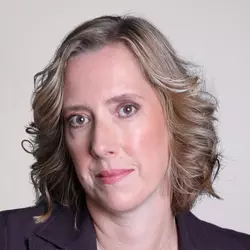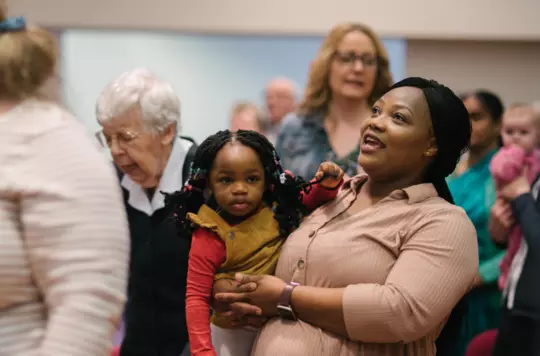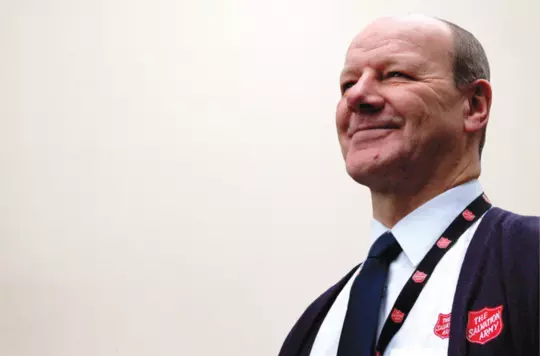25 November 2023
How is The Salvation Army working with survivors of domestic abuse?
Lyn Woods

Lyn Woods talks to Restored UK CEO Bekah Legg and Director of Family Ministries Major David Betteridge about their partnership working with survivors of domestic abuse.
Help is available For confidential, non-judgemental support and information, contact the freephone 24-hour National Domestic Abuse helpline on 0808 2000 247 (UK) or 1800 341 900 (Ireland). If you are in danger, call 999.
What is Restored UK and how did your collaboration with the Army come about?
Bekah Restored UK was founded 13 years ago as a response to violence against women and girls. Our research showed that the form of violence most women were most likely to experience was domestic abuse, which is as prevalent within the Church as it is outside it.
As an organisation, we have three key focuses. First, to speak up about violence against women and girls, to raise awareness. Second, to support survivors, especially Christian women who have been subjected to domestic abuse. Third, to equip churches to recognise and respond to domestic abuse.
Last year we launched our Restored Beacon network, where churches partner us to stand against domestic abuse in all its forms – physical, mental, emotional, financial, spiritual – supporting survivors and changing the culture in their communities, starting within the Church.
David My passion as an officer to stand against abusive behaviour – particularly within domestic situations and certainly within the Church – has been used by God in my appointment as Director of Family Ministries.
I wanted to make a difference in this area for us as The Salvation Army and to explore first how we were addressing the issue of domestic abuse within our Movement. God requires that we have our own house in order before we can seek to address the impact of these sinful behaviours on those outside it. Honest introspection and accountability for any historical failings in this area are vital for us to work justly and support people outside our churches with integrity.
Restored UK has a wealth of experience and resources to train and support advocates at corps and centres and, in turn, those who are victimised, and we are honoured to be working with them.
How does this partnership connect with Army mission priorities?
David The most obvious ways are in seeking justice and reconciliation for survivors and serving others without discrimination, in relation to both victims and perpetrators of domestic abuse.
My Family Ministries role brings with it responsibility for women’s ministries – we’re fighting to make sure that women and girls are treated in the way they ought to be as people who belong to the Kingdom. The Army has a great history of allowing women to be leaders and respecting women as leaders. The challenge for current leaders is in recognising that there is still some way to go in seeking justice for all women within the Army, the Church and across the world.
Men absolutely need to be part of this process. We need men to speak up and be part of the solution. Many men experience domestic abuse themselves, and we need to hear their voices.

Part of my passion is to make sure that there is good Christian teaching on the issue of domestic abuse, thus nurturing disciples of Jesus. It’s essential that Scripture isn’t weaponised and used in inappropriate ways, perpetuating abusive behaviours that are wholly against God’s wishes. Over time, the Bible has been misrepresented and misinterpreted to justify abuse within the Church and within the home. Subordination of women in this way is not acceptable.
Christ must be at the centre of all we do, if there is to be any real and enduring transformation of any situation. Sharing the good news that God is enough for any circumstance, in every circumstance, is what we hold on to and what motivates us.
What courses and training does Restored UK offer?
Bekah Our survivors’ network is entirely online and people can join different courses, including a recovery and a wellbeing course. Churches can choose to run recovery courses too, which can be a great outreach into the community.
For churches who become designated Restored Beacons, each beacon can look slightly different. At its core is the idea that people are no longer alone and that they have a community who will walk alongside them. On one level it is enhanced pastoral care, but you can say: ‘We’re not the experts, but we will walk with you and support you any way we can.’
One of the recovery courses follows the same flow as a normal recovery course in understanding domestic abuse, understanding yourself and knowing your value. It tackles and breaks down some of the theological misconceptions that leave survivors tied up in knots. Things that, on one hand, can be beautiful – such as forgiveness, being servant-hearted and putting others first – but which can be manipulated or just plain misunderstood, leaving survivors feeling as though they should have tried harder or prayed or persevered more.
A survivor’s recovery often only goes so far because they still have old worries going back years and believe God is angry with them. Helping them let go of that is incredibly powerful.
This theology is not only woven into our survivor courses but also into the three-level training for churches. The first, domestic abuse awareness, takes a theological look at why domestic abuse happens. The second, understanding domestic abuse, teaches about God’s intentions for relationships and encourages church leaders to consider how an understanding of domestic abuse should affect the way they preach, pray with somebody or respond to something. The third, supporting a survivor, explores walking alongside somebody on their journey to wholeness.
It’s about understanding the theology around all that and, most importantly, going back to Genesis and God’s original intention for how men and women should live alongside each other and together with him in community.
What advice do you have for a corps or centre considering becoming a Restored Beacon?
Bekah For consistency and continuity you need somebody who is passionate about domestic abuse and prepared to take the lead, preferably not the corps officer, who at some point will move on. You will need your leadership team to be on board and prepared to undertake the training and support it fully.
David Family Ministries is available to support corps and centres in any way they need. All too often funding can be a stumbling block. For the Restored Beacon church training, provided in partnership with Restored UK, funding is available through our fundraising team. We don’t want concerns about money to prevent corps and centres from undertaking this vital work.
Bekah When we train a church, we’re clear that you can extend support to whoever needs it in your community, within your capacity to do so. Restored UK is more limited in this way as a smaller organisation.
David My predecessors sought to address the issue of domestic abuse and I respect and honour them for that and recognise God’s perfect timing in bringing things together at this point. With my responsibilities for Family Ministries throughout the territory, supported by Assistant Director of Family Ministries Deb Juster – who is taking the lead on our domestic abuse response – along with my team and Restored UK, I believe that God has created the way forward. We want to continue to allow him to use it in the fullest way possible.
Written by

Lyn Woods
Editorial Assistant
Discover more

Support, training and resources to inspire families and individuals to flourish and develop in their faith journey.

Lieutenant Amanda Sewell (Thorndale Family Centre) tells Salvationist about new domestic abuse training in the Ireland Division.

Secretary for Mission Lieut-Colonel Drew McCombe (THQ) reflects on what it means to belong to Jesus.
